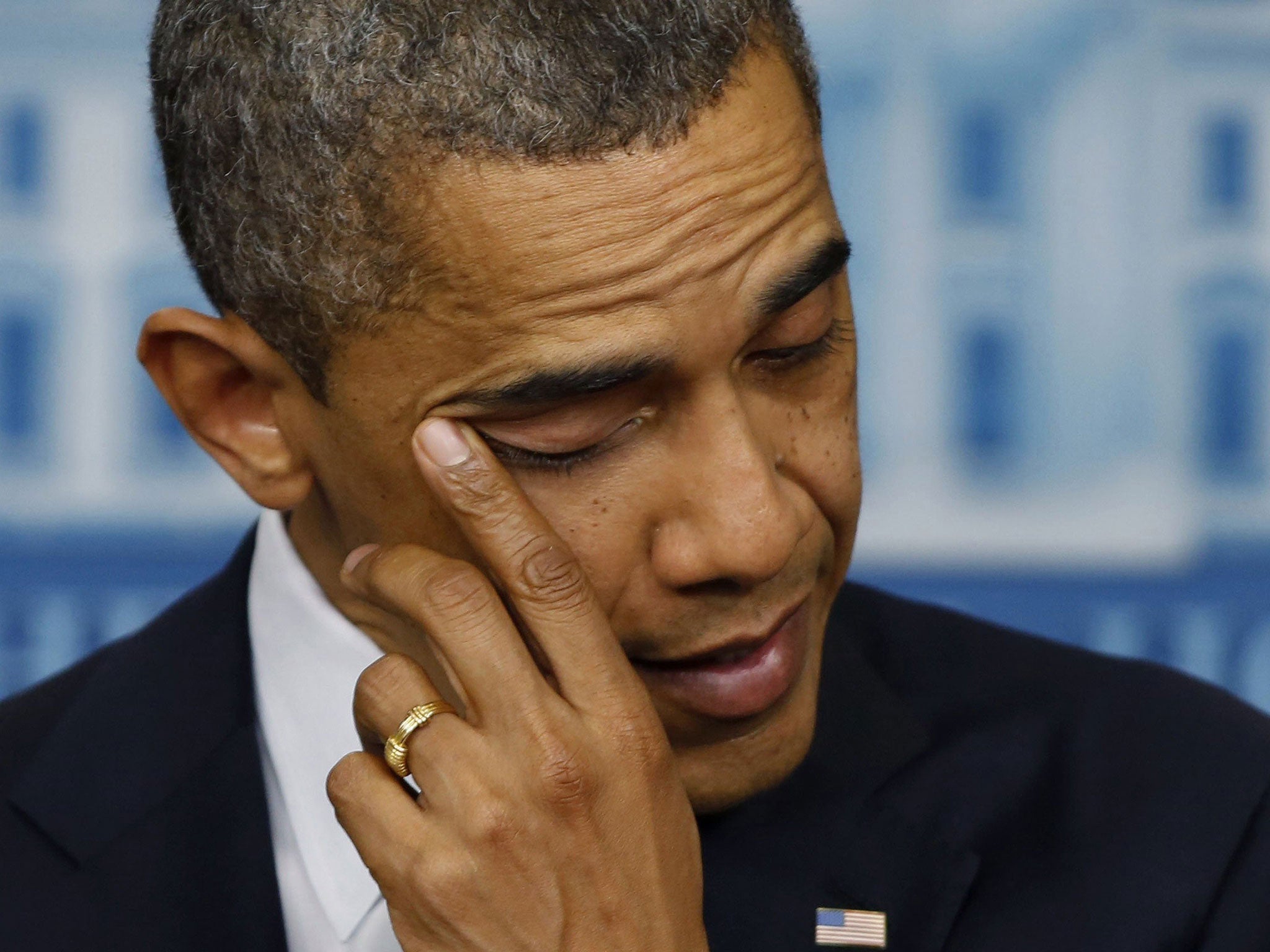Newtown: What we learnt from Obama’s speech and what we can expect from US gun laws in future
The vigil was no time to elaborate on policy; that job comes now

It was a familiar scenario. Barack Obama’s speech to nine hundred mourners in Newtown, Connecticut counted as the fourth time the US president has been forced to address the local victims of a mass shooting. Things were a little different this time, though: the president’s hair was a little greyer, his face more gaunt, and his body slightly shrunken from a recently fought campaign battle. Political circumstances had also changed. Obama was no longer fighting for his second term in power, as he was when he visited Aurora, Colorado in the wake of the Dark Knight Rises theatre shooting, and nor was he being hosted by a strong Republican state, as he was during his visits to the victims of shootings at Fort Hood, Texas in 2009 and Tuscon, Arizona in 2011.
The issue, though, was very much the same: guns, policy, reform, control. Words not used but alluded to in Obama’s speech in Newtown. “We can't tolerate this any more,” said the president. “These tragedies must end. And to end them, we must change."
Like clockwork, Obama’s sensitivity was met with righteous indignation from both sides of the political spectrum. Left-wingers complained the speech had balked at the details: the novelist Linda Grant tweeted “Is it just me who found Obama’s speech last night wooly and evasive?” while a Republican representative from Texas, Louis Gohmert, said the tragedy could have been prevented had teachers at the school been properly armed.
Not the place
Both opinions overlooked a respect for grief that Obama, conversely, maintained assiduously. This was a privately held vigil: not the time to be waving flags, pushing congress, or waging war with the National Rifle Association.
But as the dust settles on Newtown and Obama returns to Washington for talks with Joe Biden, who the Washington Post say has been put in charge of the new initiative to reduce gun violence, the Democrats find themselves at a decisive fulcrum. Though White House spokesman Jay Carney yesterday said that the president supported reinstating a ban on assault weapons that had expired under George W Bush in 2004, he also acknowledged the complexity of the problem, stating "No single piece of legislation, no single action will fully address the problem."
A wide scale approach to the issue was similarly anticipated by Obama’s address at the vigil in Connecticut, in which he promised to “engage my fellow citizens, from law enforcement, to mental health professionals, to parents and educators, in an effort aimed at preventing more tragedies like this.” What this points to is a probable split in the initiative: Americans can expect legislative efforts to tighten gun laws, but social reform is also being posited – the suggestion that greater emphasis be put on the country’s lacking mental health care system.
Mental Health
Neither option is a quick fix. At present, gun regulations are state defined and enacting a federal law on such a contentious issue is infamously difficult: the Democrats hold only a slim majority in the Senate and achieving the required sixty votes to pass legislation will be tricky. On top of this the NRA, the most powerful gun-lobbying group in the world, has over four million members and this year spent $17 million on federal elections. Although its silence following the Sandy Hook massacre and the intensity of protest that it is today receiving in Washington are encouraging factors, its clout should not be underestimated.
Solving the mental health issue is an equally daunting task. One of Ronald Reagan’s lasting legacies of the 1980s was the shift in focus from social policy to fiscal policy in the US. This led to the closing of mental health hospitals first in California and then grew to the majority of the United States, alongside cuts to federally-funded community mental health programmes - the kind of programmes which may have directly benefited people like Adam Lanza and James Holmes (the Aurora, Colorado gunman who went to trial earlier this year).
Pragmatically, though, the redefinition of the mental health care system is unlikely. Given the US’s continuing deficit problems and the White House’s flailing budget a reinvestment in public services seems a near impossible response to the gun control problem.
The example from Australia
With this in mind, Obama and the Democrats' best bet may be to look to Australia and the massively successful gun reforms of 1996, following Martin Bryant’s massacre of thirty six people in Port Arthur, Tasmania. The circumstances of the two shootings are even eerily similar: the violence was widespread, sustained and also directed at minors, and Bryant was mentally ill and even came from a place called Newtown. Obama and Biden should be inspired by the situation, though, in considering that change was then enacted from the top down: John Howard, prime minister at the time, spearheaded the campaign for a national firearms agreement which involved a year long amnesty and buy-back of weapons, most of which were semi-automatic.
Similarly, too, Howard was supported by a ground swell of media and public opinion comparable to that going on in the US now. Those reforms, enacted over16 years ago in direct response to a landmark tragedy, have since proved the most effective in the recent history of the gun. If Obama and Biden can muster a strong leadership effort from the top while harnessing the power of growing public opinion, they may begin to dream about a similar victory.

Join our commenting forum
Join thought-provoking conversations, follow other Independent readers and see their replies